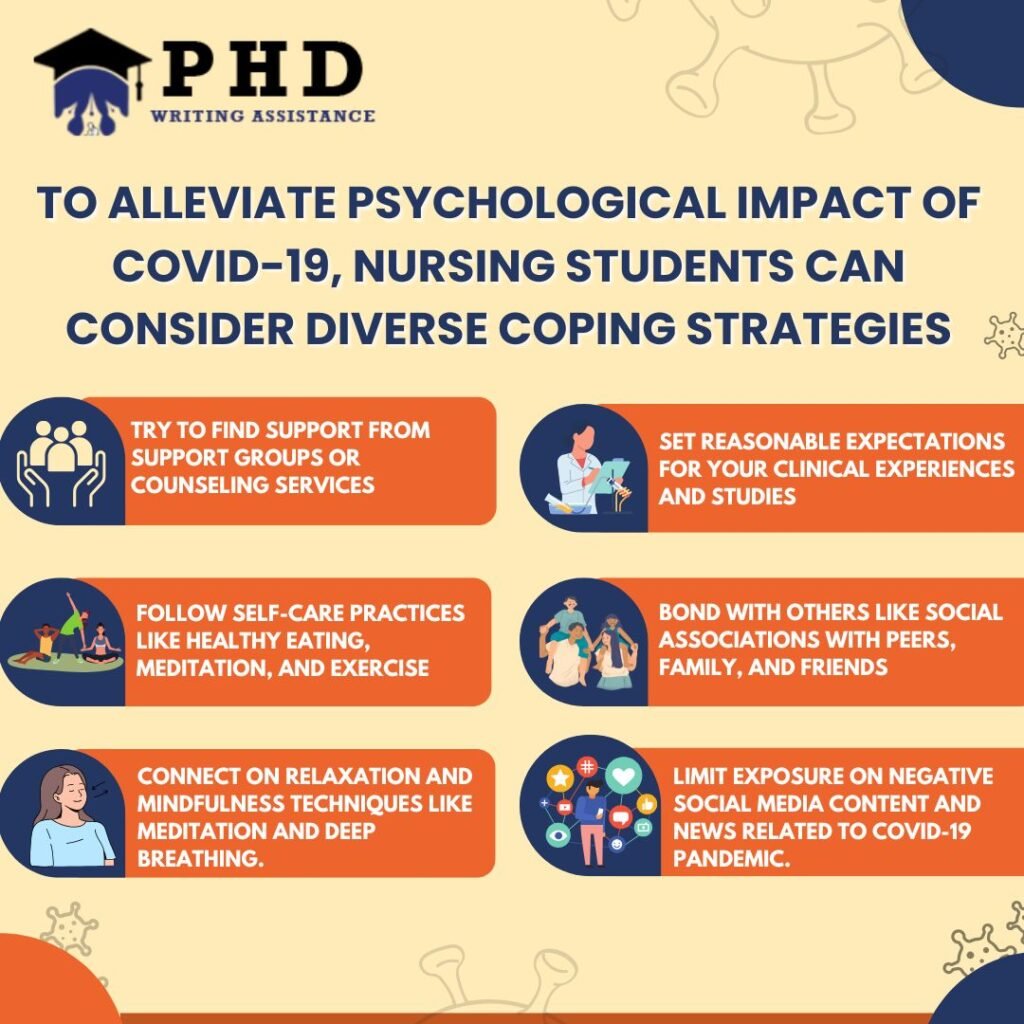
PSYCHOLOGICAL IMPACT OF COVID-19 ON NURSING STUDENTS
- by phdblog
The COVID-19 pandemic in particular had a huge impact on healthcare professionals at a global level, with nursing students for the most part experiencing the psychological impact of the COVID-19 pandemic. Whilst the healthcare systems united to manage, they never experienced a public health catastrophe of such scale. Nursing students were pushed deeper into a demanding and uncertain environment, challenging their psychological and emotional resilience. The multifaceted impact of COVID-19 on nursing students is deep, affecting burnout, psychological health, trauma, stressful situation, and long-term impacts on their professional identity and education. In this blog post, we will look at the diverse psychological impact of COVID-19 on nursing students and talk about strategies to deal with the effects of the COVID-19 pandemic and to seek support (Arnetz et al., 2020).
The psychological toll of continuously facing such often fatal and highly infectious diseases cannot be understated. Nursing students, and most of them directly involved in patient care, in particular experienced burnout and emotional exhaustion. They were affected emotionally by the suffering of affected families, the death of affected patients, and the fear of becoming ill themselves.
The initial wave of the COVID-19 pandemic left the global public facing uncertainty, and for nursing students, stress was two-fold due to their professional commitments. Faced with the reality of caring for COVID-19 patients, most nursing students found themselves on the frontlines against the backdrop of clinical placements. Moreover, the anxiety of contracting the virus, combined with their ethical commitment to serve others, aggravated the anxiety levels (Sveinsdóttir et al., 2021).
The COVID-19 pandemic may leave a long-lasting psychological impact on nursing students by influencing their future professional choices and professional identity. Even as many nursing students have come forward with a reinforced sense of commitment and purpose to their profession, others may feel disillusioned. The unforgiving realities of working in an overstrained healthcare system during the COVID-19 pandemic have led some nursing students to reconsider their professional career paths.
The extended nature of the COVID-19 pandemic further deepened feelings of hopelessness and depression among nursing students. Continuous exposure to death and illness, also combined with the disruption of normal life and social isolation, led to an increase in mental health struggles. In general, most students faced challenges accessing mental health support, which was either overwhelmed or unavailable due to the COVID-19 pandemic. This contributed to feelings of vulnerability, further escalating risks related to long-term psychological effects (Labrague & Santos, 2020).
The COVID-19 pandemic caused large-scale disruption to traditional nursing education. The classroom lectures were moved online, and most students had inadequate access to hands-on training as a result of clinical placement postponement. The shift to remote online learning led to feelings of disconnection and loneliness. For the nursing students, who mostly depend on in-person practical experiences, the gap in hands-on experiences was totally distressing. They even feared being improperly prepared for any real-life clinical circumstances, thereby escalating their concerns about their future professional proficiency (Aslan & Pekince, 2020).
Coping Strategies for Nursing Students:
To alleviate the psychological impact of COVID-19, nursing students can consider diverse coping strategies:
- Try to find support from support networks or counseling services.
- Set reasonable expectations for your clinical experiences and studies.
- Follow self-care practices like healthy eating, meditation, and exercise.
- Bond with others through social associations with peers, family, and friends.
- Connect through relaxation and mindfulness techniques like meditation and deep breathing.

The psychological impact of COVID-19 on nursing students has been enormous, with burnout, stress, anxiety, and long-term emotional exhaustion affecting many. Even as the COVID-19 pandemic has tested their adaptability and resilience, it has also revealed major gaps in educational preparedness and mental health support. As humankind moves forward, addressing all these concerns and providing continuing psychological care for nursing students will be critical to maintaining their well-being and ensuring the future strength of the nursing profession (Savitsky et al., 2020).
References
1. Arnetz, J. E., Goetz, C. M., Arnetz, B. B., & Arble, E. (2020). Nurse Reports of Stressful Situations during the COVID-19 Pandemic: Qualitative Analysis of Survey Responses. International Journal of Environmental Research and Public Health, 17(21), 8126.
2. Aslan, H., & Pekince, H. (2020). Nursing students’ views on the COVID‐19 pandemic and their percieved stress levels. Perspectives in Psychiatric Care, 57(2), 695–701.
3. Labrague, L. J., & Santos, J. a. A. (2020). COVID‐19 anxiety among front‐line nurses: Predictive role of organisational support, personal resilience and social support. Journal of Nursing Management, 28(7), 1653–1661.
4. Savitsky, B., Findling, Y., Ereli, A., & Hendel, T. (2020). Anxiety and coping strategies among nursing students during the covid-19 pandemic. Nurse Education in Practice, 46, 102809.
5. Sveinsdóttir, H., Flygenring, B. G., Svavarsdóttir, M. H., Thorsteinsson, H. S., Kristófersson, G. K., Bernharðsdóttir, J., & Svavarsdóttir, E. K. (2021). Predictors of university nursing students burnout at the time of the COVID-19 pandemic: A cross-sectional study. Nurse Education Today, 106, 105070.
The COVID-19 pandemic in particular had a huge impact on healthcare professionals at a global level, with nursing students for the most part experiencing the psychological impact of the COVID-19 pandemic. Whilst the healthcare systems united to manage, they never experienced a public health catastrophe of such scale. Nursing students were pushed deeper into a…
